Regius Professors of Divinity
John Kaye (1783-1853)
In post 1816-1827
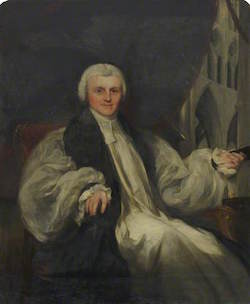 John Kaye was born in Hammersmith on 27 December 1783. He received his early education under the supervision of Dr Charles Burney, the eminent Greek scholar, and then studied at Christ’s College, Cambridge. In 1804 he achieved his degree with the highest possible distinctions in both classics and mathematics, only the second student to achieve this ‘double’. His brilliance assured him of a glittering career and his College immediately elected him a Fellow. Ten years later, aged 31, he was elected its Master. He served as Vice-Chancellor of the University in 1815-16 and then in the latter year was elected Regius Professor of Theology, in which role he revived the lapsed tradition of giving public lectures.
John Kaye was born in Hammersmith on 27 December 1783. He received his early education under the supervision of Dr Charles Burney, the eminent Greek scholar, and then studied at Christ’s College, Cambridge. In 1804 he achieved his degree with the highest possible distinctions in both classics and mathematics, only the second student to achieve this ‘double’. His brilliance assured him of a glittering career and his College immediately elected him a Fellow. Ten years later, aged 31, he was elected its Master. He served as Vice-Chancellor of the University in 1815-16 and then in the latter year was elected Regius Professor of Theology, in which role he revived the lapsed tradition of giving public lectures.
He was keen to re-establish study of the Patristic Fathers and his lectures on early church history, illustrated by the writings of Justin Martyr and Tertullian and later published, were much admired. He was considered a great orator in Latin and was much lauded in his official professorial duties. He was made Bishop of Bristol in 1820 aged 36, an extraordinarily young age to be given such preferment. At first, he tried to keep his University connections active but in 1827, he finally resigned his professorship on his translation to Lincoln, a much larger see that he occupied until his death. He remained Master of Christ’s until 1830, when the dual role of bishop and College head proved too great a challenge.
Zealous in his episcopal duties, being responsible for a marked revival in church life in his diocese, he was much admired as humble and unassuming, comfortable and accessible to all classes of society. He was a very generous man and gave much to charity, often in hidden ways known only to the recipients and a small circle.
He continued to research and write, including producing volumes on Clement of Alexandria and the Athanasian Creed. He also published sermons and charges. He was judged to write accessible and unadorned prose in an age when that was not always considered a virtue.
He died as Bishop of Lincoln on 18 February 1853 aged 69.
Thomas Turton (1780-1864)
In post 1827-1842
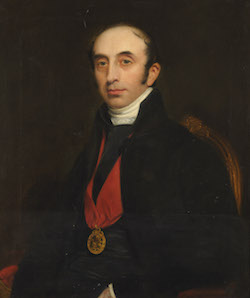 Thomas Turton was born in Yorkshire on 5 February 1780. He went up to Cambridge in 1801 to Queens’ College, transferring to St Catharine’s three years later. After a brilliant undergraduate career, he was given a fellowship at the latter college in 1806. He was ordained in 1813.
Thomas Turton was born in Yorkshire on 5 February 1780. He went up to Cambridge in 1801 to Queens’ College, transferring to St Catharine’s three years later. After a brilliant undergraduate career, he was given a fellowship at the latter college in 1806. He was ordained in 1813.
His academic prowess spanned many subjects and he was also a composer of church music. In 1822 he was elected Lucasian Professor of Mathematics. He exchanged this for the Regius Chair in Divinity in 1827. As was usual in his day, his academic positions did not prevent him taking ecclesiastical posts in parallel. After occupying two rectorial livings, in 1830 he was named Dean of Peterborough Cathedral. On his transfer to the Deanship of Westminster in 1842, he resigned his professorship. In 1845 he was consecrated as Bishop of Ely.
In his theological publications, he was a controversialist. In the 1830s, he engaged in an argument with Dr (later Cardinal) Wiseman on the doctrine of the Eucharist, which resulted in several publications. He also wrote on the issue of non-Anglicans taking degrees in Cambridge and in 1836 a treatise on natural theology.
He died on 7 January 1864, still serving as Bishop of Ely, a few weeks before his 83rd birthday.
Alfred Ollivant (1798-1882)
In post 1843-1849
Alfred Ollivant was born in Manchester on 16 April 1798, the son of a clerk in the Navy office, and was educated in London. He went to Trinity College, Cambridge, where he won many prizes and was an exemplary student. In 1823, the College made him a Fellow and a year later he was ordained. As was then the custom, he had to resign his Fellowship when he married in 1828, the year after he accepted the position of Vice-Principal of the newly-founded St David’s College, Lampeter, alongside a professorship in theology and Greek. Here, he became fluent in the Welsh language and served as Rector or Vicar of several parishes in succession.
In 1843, he was chosen as a candidate for the Regius chair in Cambridge and as was the custom then he had to give an address on a given subject. Not only was he learned and skilled in argument, but it is said his sincerity and conviction impressed those judging. He was elected over his rivals for the Chair. He took a full part in the affairs of the University as well as discharging his lecturing duties and he was well-regarded, especially as he was a humble and unpretentious man.
In 1849, he was appointed Bishop of Llandaff in Wales and so resigned the chair. He faced a difficult challenge in Wales as the See was very poor and had suffered neglect. But for over thirty years he worked tirelessly to improve the situation, both raising money to repair and build churches, restore the cathedral, and also to provide the means for suitable candidates to train for ordination. Despite many of his clergy disdaining Welsh for services, he was happy to preach in the language and thereby was much appreciated by local people.
In theology, Bishop Ollivant was called ‘plain and straightforward’, unmoved by rhetorical flourishes or abstruse arguments. He published little that was original or speculative, but instead concentrated on re-iterating the faith as he had been taught. He published several volumes of sermons. His skill in Hebrew led to his involvement in the revision of the Old Testament.
He died on 16 December 1882, still at work in his diocese aged 84.
James Amiraux Jeremie (1802-1872)
In post 1850-1870
James Jeremie was born in St Peter’s Port, Guernsey, on 12 April 1802. His father was a merchant and could afford to send him to school in England. Jeremie graduated from Trinity College, Cambridge in 1824. A Fellow of his college from 1826, he was ordained in 1830. The same year, he became Professor of Classical and General Literature at Haileybury College, the East India Company’s educational institution at Haileybury. He was a popular lecturer.
In the Church, he was appointed to a prebendal stall in Lincoln Cathedral in 1834 by his patron and friend, Bishop Kaye (a former holder of the Regius chair in Cambridge) and in 1848 he became Sub-Dean. Although he was a sound and well-read theologian, he published little in terms of scholarly work. However, he was known as a preacher and many of his sermons were published. Perhaps because of his teaching abilities and his role as Christian advocate in the University of Cambridge (since 1833), he was elected to the Regius chair in 1850. In subsequent years, his scholarly contribution was a series of encylopedia articles. He wrote a great deal more but was too fastidious and ‘nervously sensitive’ to publish it. He was a man dogged by indecision.
He was persuaded in 1864 to become Dean of Lincoln Cathedral, yet at the same time not to resign his professorship. Now in his sixties, the dual role stressed his health and neither Lincoln nor Cambridge proved happy with the arrangement, though both wished to keep him. Eventually Lincoln ‘won’ and he resigned the Regius chair in 1870, gifting £1000 to the Faculty as a leaving present to establish prizes for the study of the Septuagint.
He died on 11 June 1872 and his body was taken back to Guernsey for interment. His inability to make a decision as to which institution should inherit his excellent library meant that after his death it was sold and dispersed.
Brooke Foss Westcott (1825-1901)
In post 1870-1890
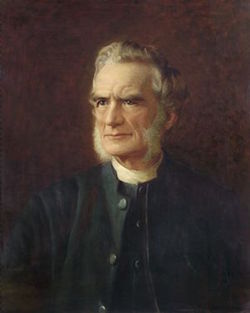 Brooke Foss Westcott was born in Birmingham on 12 January 1825. His father was a lecturer in botany and encouraged his son to take an interest in nature, painting and sketching in particular, a hobby he maintained all his life. The Westcott home was simple, almost frugal, and when Brooke went up to Trinity College, Cambridge, in 1844, he retained a disciplined way of life, rising early, eating modestly and studying hard. He took firsts in both mathematics and classics and was rewarded with a Fellowship at his College in 1849, before ordination in 1851.
Brooke Foss Westcott was born in Birmingham on 12 January 1825. His father was a lecturer in botany and encouraged his son to take an interest in nature, painting and sketching in particular, a hobby he maintained all his life. The Westcott home was simple, almost frugal, and when Brooke went up to Trinity College, Cambridge, in 1844, he retained a disciplined way of life, rising early, eating modestly and studying hard. He took firsts in both mathematics and classics and was rewarded with a Fellowship at his College in 1849, before ordination in 1851.
As Fellows could not marry, he left Cambridge in 1852 on his marriage and he and his wife went to Harrow School, where he taught. His shy nature made maintaining classroom discipline hard and he struggled in the job. However, he escaped in vacations by working on a critical edition of the New Testament (Revised Version) with his friend Fenton Hort, a task that took 28 years to complete and was one of the most significant 19th-century contributions to biblical studies. He also completed books in the history of the New Testament and a theology of the resurrection.
In 1870, his scholarly pursuits were rewarded by election to the Regius chair of theology in Cambridge. He combined it with canonries, firstly at Peterborough and then Westminster Abbey, the sermons he preached being published in a series of books. In the critical commentary series in which he collaborated with Hort and Lightfoot, his subjects were St John’s Gospel, the Johannine Epistles and Hebrews. Here he revealed his deep Patristic knowledge and theological understanding as well as critical acumen. He lectured mainly on early Church history and doctrine, until his friend Lightfoot went to Durham to be bishop which prompted Westcott to take on New Testament teaching. He would draw crowds of several hundred students so stimulating were his lectures.
Westcott also very concerned about foreign missions, Christian socialism (he was the first president of the Christian Social Union founded in 1889) and the training of the clergy. With respect to the last, he was instrumental in establishing a new preliminary examination for ordinands, so as to raise academic standards, and helped found the Clergy Training School in Cambridge, which after his death would be named after him.
In 1889, his friend Lightfoot died and he was selected as his successor as Bishop of Durham in 1890 and left Cambridge. As a bishop, Westcott was known for his social concerns, bringing trade unions and employers together for meetings at his episcopal residence and he helped resolve a bitter miners’ strike in 1892. His numerous activities eventually took a toll on his health. He was very grieved by the death of his wife in May 1901 and on 27 July following he too died.
Henry Barclay Swete (1835-1917)
In post 1890-1915
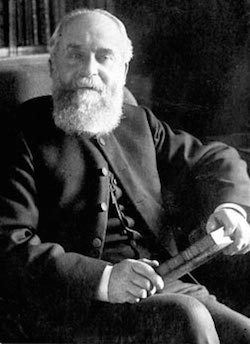 Henry Barclay Swete was the son of a clergyman, born at Redland Hill, Bristol, on 14 March 1835. He took a first-class degree in the Classical Tripos at Gonville & Caius College, Cambridge, and was elected a Fellow there in 1858. The same year he was ordained and became a curate in Blagdon, Somerset. He then took a second curacy in Cambridge, before returning to Devon for a third until 1872. From 1875, he was a lecturer in the Faculty of Divinity. In 1877, he accepted the College living of Rector of Ashdon in Essex and resigned his Fellowship in 1878. Swete continued as Rector even when appointed Professor of Pastoral Theology at King’s College, London, in 1882. However, he resigned both positions when elected as Regius Professor in Cambridge in 1890, the year he also was re-admitted to a Fellowship at his College.
Henry Barclay Swete was the son of a clergyman, born at Redland Hill, Bristol, on 14 March 1835. He took a first-class degree in the Classical Tripos at Gonville & Caius College, Cambridge, and was elected a Fellow there in 1858. The same year he was ordained and became a curate in Blagdon, Somerset. He then took a second curacy in Cambridge, before returning to Devon for a third until 1872. From 1875, he was a lecturer in the Faculty of Divinity. In 1877, he accepted the College living of Rector of Ashdon in Essex and resigned his Fellowship in 1878. Swete continued as Rector even when appointed Professor of Pastoral Theology at King’s College, London, in 1882. However, he resigned both positions when elected as Regius Professor in Cambridge in 1890, the year he also was re-admitted to a Fellowship at his College.
Through these years of different appointments, he perfected his knowledge of languages and a vast range of learning in several fields. In the 1870s he produced works on the history of the doctrine of the Holy Spirit. However, Biblical scholarship was his main interest and in 1883 he began the detailed and painstaking work of a recension of the entire Septuagint. It was issued in several volumes between 1887 and 1894 and would be produced in several editions. Swete also produced classic commentaries on St Mark’s Gospel and the Apocalypse of St John. He was considered indispensable for his field of study as a source of knowledge and judgement.
He retired from his chair in 1915 at the age of 80 (a decision The Cambridge Review called ‘lamentable’) and died two years later in Hitchin on 10 May 1917. His obituary in The Times said that the Church of England had lost one of “the most learned, acute, and assiduous of her divines.”
Vincent Henry Stanton (1846-1924)
In post 1916-1922
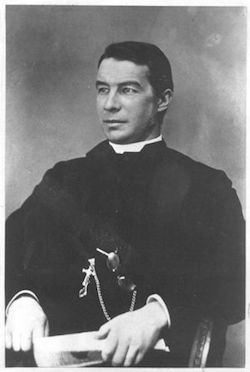 Vincent Stanton was born on 1 June 1846 in Hong-Kong, the son of a colonial chaplain, but he was sent to school in Britain. He read classics and mathematics at Trinity College, Cambridge. In 1872, he was elected a Fellow of his college, then same year he was made deacon. In 1889, he was appointed the first Ely Professor of Divinity, holding the post for 27 years, until in 1916 he was elected to the Regius chair.
Vincent Stanton was born on 1 June 1846 in Hong-Kong, the son of a colonial chaplain, but he was sent to school in Britain. He read classics and mathematics at Trinity College, Cambridge. In 1872, he was elected a Fellow of his college, then same year he was made deacon. In 1889, he was appointed the first Ely Professor of Divinity, holding the post for 27 years, until in 1916 he was elected to the Regius chair.
His academic interests straddled New Testament studies and philosophy of religion. His obituarist in The Times noted that he wrote little but what he did publish was of high quality. His greatest contemporary acclaim came from a three-volume work: The Gospels as Historical Documents, published in 1903, 1909 and 1920 and considered at the time indispensable to any student of the New Testament. He was also keen to promote philosophy of religion and endowed a lectureship in the subject in 1904, the first holder being Vernon Storr.
Stanton was a shy man and was not a good public speaker, his lectures being rather detailed and unexciting. Yet he was much admired, not least because he was known as an unselfish man, who would ever promote and help others before putting himself forward. He was a keen supporter of overseas missions too, both in giving generously of his own money and also in giving advice
He resigned his Regius chair in 1922, aged 76, and died on 8 June 1924 in Cambridge. His considerable estate was mainly left to charities, about half going to Westcott House to help complete the college buildings and to found bursaries for poorer students.
Alexander Nairne (1863-1936)
In post 1922-1932
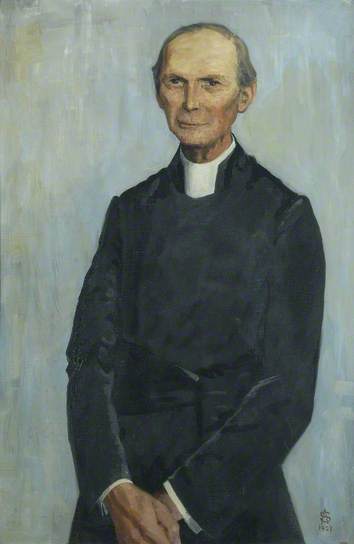 Alexander Nairne was a clergyman’s son born on 17 January 1863 in Hertfordshire. He took a first-class degree at Jesus College, Cambridge, in Classics in 1884 and Theology in 1886. He was ordained in 1887 and made a Fellow of his college the same year. His clerical positions included being Vicar of Tewin in Hertfordshire 1894-1912, and canon of Chester Cathedral 1914-22, but simultaneously he pursued an academic career. He was Professor of Hebrew and Old Testament Exegesis at King’s College, London 1900-17, where his easy style of lecturing made him very popular. He returned to Cambridge to Jesus College as Dean in 1917. In 1922, he was elected to the Regius chair. The year before, he had been made a Canon of Windsor and so he divided his time between there and Cambridge. This was possible because he would take no part in University or Faculty business, much to the exasperation of some colleagues. His ability to connect with undergraduates however made him an inspiring teacher. He resigned his professorship in 1932, remaining a Canon at Windsor, but still spent some of each term in Cambridge up to his death.
Alexander Nairne was a clergyman’s son born on 17 January 1863 in Hertfordshire. He took a first-class degree at Jesus College, Cambridge, in Classics in 1884 and Theology in 1886. He was ordained in 1887 and made a Fellow of his college the same year. His clerical positions included being Vicar of Tewin in Hertfordshire 1894-1912, and canon of Chester Cathedral 1914-22, but simultaneously he pursued an academic career. He was Professor of Hebrew and Old Testament Exegesis at King’s College, London 1900-17, where his easy style of lecturing made him very popular. He returned to Cambridge to Jesus College as Dean in 1917. In 1922, he was elected to the Regius chair. The year before, he had been made a Canon of Windsor and so he divided his time between there and Cambridge. This was possible because he would take no part in University or Faculty business, much to the exasperation of some colleagues. His ability to connect with undergraduates however made him an inspiring teacher. He resigned his professorship in 1932, remaining a Canon at Windsor, but still spent some of each term in Cambridge up to his death.
His published works were accessible and full of insight but did not please scholarly critics. His interests were wide and enthusiastic but he failed at times to be sufficiently grounded in historical rigour and (to Hebraists) in grammatical accuracy to placate his detractors. His Faith of the Old Testament (1914) and Faith of the New Testament (1920) were coolly received. It was the ideas that excited him and which he conveyed. His Times obituary called him ‘an artist rather than a critic’.
He was something of a charming eccentric. His obituary in The Times was headed ‘a rare, unworldly spirit’. He had married in 1889 (widowed in 1921) but the lack of any children of the marriage was attributed to his attachment to celibacy. He was generous to a fault and gave away most of his money, sometimes to people who exploited his good nature. He never read newspapers and took no interest in politics or world affairs. He loathed modern ‘gadgets’ apart from his one comfort of excessive heating. He ate very little, a plate of brussel sprouts smothered in cayenne pepper being a ‘meal’ to him. He had a passion for sketching (which was a common pastime in meetings when he was forced to attend them) and painting.
He died at the Cloisters, Windsor Castle, on 15 March 1936, much mourned by those who had benefitted from his kindness and many who had grown to love him.
Charles Earle Raven (1885-1964)
In post 1932-1950
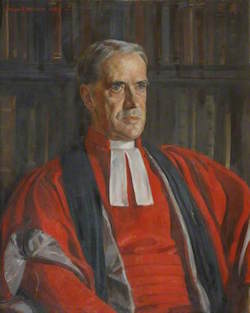 Charles Raven was born on 4 July 1885, son of a barrister, and brought up in London. Excelling at school in both natural history and classics, he read the latter at Gonville & Caius College, Cambridge, swopping to theology for his Part 2 and taking a first in both. He did not initially desire ordination and took a civil service job in Liverpool, which brought him into direct contact with children living in deprived conditions. This led to his commitment to Christian socialism, something he wrote about and championed for the rest of his life.
Charles Raven was born on 4 July 1885, son of a barrister, and brought up in London. Excelling at school in both natural history and classics, he read the latter at Gonville & Caius College, Cambridge, swopping to theology for his Part 2 and taking a first in both. He did not initially desire ordination and took a civil service job in Liverpool, which brought him into direct contact with children living in deprived conditions. This led to his commitment to Christian socialism, something he wrote about and championed for the rest of his life.
In 1909, he was offered the Deanship of Emmanuel College, Cambridge, (along with a lectureship in theology), which entailed him being ordained. His oratorical skills made him an eloquent and powerful lecturer and preacher, influential on many who heard him. During the First World War he served as a chaplain to the forces and what he witnessed led him to take a pacifist position, a subject which again he wrote on extensively for the rest of his life and which, along with his socialism, made him unpopular in some quarters. After 1918 he took a parish and then later became a Canon at Liverpool Cathedral. In the eyes of contemporaries, he was sometimes controversial - and prophetic - for example in his being an early advocate of the ordination of women.
His theological and social writings were extensive and admired, yet his election as Regius Professor in 1932 was a surprise to many as he was hardly a ‘safe’ choice. His inaugural lecture stressed the importance of applying Christian principles to social and political life. His writings after his election were particularly concerned with the unity of science and religion. His early scientific interests had been maintained. He was a prolific drawer of flowers and wildlife, serving as President of the Botanical Society of the British Isles at one point. He wrote scholarly books on the history of English naturalists during the 1940s to follow several on birds published in the 1920s. Elected to a Fellowship at Christ’s College on his return to Cambridge, he became its Master in 1939. He retired from this post and his professorship in 1950, but remained an active ‘in-demand’ speaker in his retirement.
He died on 8 July 1964 at home in Cambridge.
Arthur Michael Ramsey (1904-1988)
In post 1950-1952
Arthur Michael Ramsey was born in Cambridge on 14 November 1904, the son of a mathematician who became president of Magdalene College. Educated at Repton School and then his father’s college, he took a second in classics and a first in theology. He went on to train for the Anglican priesthood at Cuddesdon College, near Oxford. He was ordained in 1928 to a curacy in Liverpool. From 1930 to 1936, he was sub-Warden of Lincoln Theological College. He then had two short parochial positions in Boston and then Cambridge (Vicar of St Bene’t’s 1938-40) before election in 1940 to a professorship in Durham University. He was elected to the Regius Chair in Cambridge in 1950.
His academic reputation in theology was founded on a series of significant books, the first being The Gospel and the Catholic Church (1936). He also wrote on the resurrection, the transfiguration and other doctrinal subjects, as well as on the history of theology, most notably From Gore to Temple (1960), and published books of sermons. His book on the Christian priesthood (1972) is also well-known. He had a sonorous and slow speaking delivery which made him an entrancing lecturer and preacher, whilst his craggy features and prominent eyebrows gave him a venerable appearance.
His time as Regius was brief. In 1952, to the dismay of his colleagues, he accepted appointment as Bishop of Durham. His ecclesiastical rise was swift, becoming Archbishop of York in 1956 and then the 100th Archbishop of Canterbury in 1961. His tenure in the last position, from which he retired in 1974, was noteworthy for his ecumenical activities, which he prioritised in the new inter-denominational openness that came in the 1960s. He became a friend of Pope Paul VI, Patriarch Athenagoras of Constantinople and Patriarch Alexei of Moscow, close contacts that would have been unimaginable in a previous archepiscopate. He supported a union of the Church of England with the Methodist Church but was disappointed this was not achieved.
He died on 23 April 1988 in a nursing home in Oxford.
John Burnaby (1891-1978)
In post 1952-1958
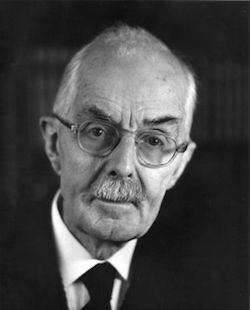 Son of a clergyman, John Burnaby was born on 28 July 1891 in Yorkshire. He went up to Trinity College, Cambridge, in 1910 and took a first-class degree in Classics. During the latter part of his studies, the First World War broke out and he was serving at Gallipoli when he was elected a Fellow of his college. Returning to Cambridge in 1919, his college had an abundance of classicists so he was given administrative duties such as Junior Dean and Bursar, and eventually seven years as Senior Tutor, in order that he could serve as a resident fellow. During the Second World War he was ordained and in 1943 became Dean of Chapel.
Son of a clergyman, John Burnaby was born on 28 July 1891 in Yorkshire. He went up to Trinity College, Cambridge, in 1910 and took a first-class degree in Classics. During the latter part of his studies, the First World War broke out and he was serving at Gallipoli when he was elected a Fellow of his college. Returning to Cambridge in 1919, his college had an abundance of classicists so he was given administrative duties such as Junior Dean and Bursar, and eventually seven years as Senior Tutor, in order that he could serve as a resident fellow. During the Second World War he was ordained and in 1943 became Dean of Chapel.
His academic interests were mainly centred around the study of St Augustine of Hippo. His much-praised study of the saint’s theology in Amor Dei, published in 1938, led to a college lecturership in theology in 1939 and a university position in the Faculty of Divinity in 1945, specialising in early Christian doctrine. He had a lucid and precise lecturing style which made him a good teacher and preacher. His writing was also clear and insightful and he published learned articles and further books, for example on biblical inspiration and the Nicene Creed. He also translated the later works of Augustine for the Library of Christian Classics series. He was a rare English theologian in having a working knowledge of Russian. When Michael Ramsey resigned unexpectedly in 1952, he was an obvious choice as successor in the Regius Chair.
He was a fine administrator and served the University, Faculty and College with great efficiency. He had wide interests, particularly in music, and he served for 15 years as Chair of the Faculty Board of Music during the period that the Music Tripos was being created. He was also a rock-climber, folk dancer and an accomplished actor. This full social and work life might seem at odds with his shy manner that led him to appear austere and forbidding to some of his contemporaries, an impression intensified by his sometimes abrupt and staccato manner in social conversation coupled with a terse, pungent humour. However, he was widely admired by those who knew him better and who appreciated his wisdom and understanding.
He retired in 1958 from his university and college positions and died on 6 March 1978.
Edward Craddock Ratcliff (1896-1967)
In post 1958-1964
Edward C Ratcliff was born on 16 December 1896 in Streatham, south London, his father working as a clerk at the Stock Exchange. He won a scholarship to St John’s College, Cambridge, but the First World War broke out. Unfit for military service, he worked instead for the Army YMCA in India. He returned to Cambridge in 1918 and read for the Oriental Studies Tripos. He then transferred to theology for Part 2 of the Tripos and took a first. Ordained to a curacy at St Mary’s, Ely, in 1922, two years later he was appointed Vice-Principal of Westcott House Theological College.
A Fellow of Queens’ College, Oxford, from 1930, he was chaplain there until 1937. In the Divinity Faculty, he was a lecturer in liturgiology from 1933. He was a prolific and learned reviewer, ever careful and elegant in his prose, and became known as an authority on liturgy. His major books were on the Coronation Service and the Book of Common Prayer, although his academic output was modest in quantity. In 1939, his health, never strong, became troublesome and he resigned all his positions to go for a rest cure in Italy. Then Italy joined the Second World War and he returned to serve in pastoral positions in churches in London. In 1945, he was appointed Professor of Liturgical Theology at Kings College, London. A few years later, he was elected to the Ely professorship, becoming also a Fellow of St John’s College in 1950. In 1958, he was elected to transfer to the Regius chair in the Faculty, which he held until his retirement in 1964.
He was a quiet and thoughtful man, but skilled and decisive as the chair of a meeting, without appearing to dominate. He preached well but seldom. He was careful with his delicate health but never allowed it to interfere with his work, except in some periods when he was immobilised. He never married. Instead he was devoted to his cats, something his Times, obituarist called “his most uncommon characteristic”. He died in Cambridge on 30 June 1967 aged 70.
Dennis Eric Nineham (1921-2016)
In post 1964-1969
Dennis Nineham was born on 27 September 1921 in Southampton. He graduated from Queens’ College, Oxford, in 1943 and, after ordination the following year, he returned as assistant chaplain, then chaplain, of his College and was elected into a Fellowship in 1946. His first professorial chair was that of Biblical and Historical Theology at Kings’ College, London, in 1954, followed by being Professor of Divinity in London University from 1958. He was elected into the Regius Chair in Cambridge late in 1963 and took up the position on 1 October 1964, at the same time as taking up a Fellowship at Emmanuel College. After five years, he returned to Oxford as Warden of Keble College and then moved onto a professorship in theology at Bristol University in 1980, which he held until his retirement in 1985. He served the Church of England on Synod and the Doctrine Commission and was an honorary canon of Bristol Cathedral 1980-86.
Nineham wrote on the use of the Bible, its authority and interpretation. One of his most well-known books was The Use and Abuse of the Bible (1976) and he was responsible for the Dictionary of Biblical Interpretation (1990). He also wrote on the Gospels. The nature and content of belief was of interest to him and he was an editor of and contributor to The Myth of God Incarnate, the controversial 1977 book.
He lived in his retirement in Oxford.
Geoffrey Hugo Lampe (1912-1980)
In post 1970-1979
 Geoffrey Lampe was born in Bournemouth on 13 August 1912. His father, born in Alsace, was of Dutch origin, and in 1912 he was a well-known and successful conductor of the Bournemouth Symphony Orchestra. Geoffrey won a scholarship to Exeter College, Oxford. Following a first in theology in 1936, he was ordained the next year and spent the next few years in a curacy and school teaching. In the Second World War, he was a chaplain to the Forces and won the MC for conspicuous bravery.
Geoffrey Lampe was born in Bournemouth on 13 August 1912. His father, born in Alsace, was of Dutch origin, and in 1912 he was a well-known and successful conductor of the Bournemouth Symphony Orchestra. Geoffrey won a scholarship to Exeter College, Oxford. Following a first in theology in 1936, he was ordained the next year and spent the next few years in a curacy and school teaching. In the Second World War, he was a chaplain to the Forces and won the MC for conspicuous bravery.
After the War, he served as a fellow and the chaplain of St John’s College, Oxford, before a move to Birmingham to be Edward Cadbury Professor of Theology in 1953. He came to Cambridge in 1960 to be Ely professor and a fellow of Gonville & Caius College. In 1971, he transferred to the Regius chair.
His academic expertise ranged over the whole field of Christian doctrine. He was responsible for the massive Patristic Greek Lexicon and one of his best-known works of theology was God as Spirit, his 1975-76 Bampton lectures. He was also the editor of the second volume of the Cambridge History of the Bible.
Professor Lampe was known for his sociable and warm disposition, he and his wife being generous and affable hosts of many gatherings. He was noted as a raconteur. Outside academia he was active in church affairs, being a member for years of the Church of England General Synod, where he championed the ministry of women, liturgical reform and ecumenism. In the last-named, he developed strong relations with the Lutheran churches in Scandinavia.
In the mid-1970s, he had to face serious illness on several occasions but met it all with steadfast good humour and courage. He reached retirement in 1979 and died in Cambridge less than a year later on 5 August 1980.
Henry Chadwick (1920-2008)
In post 1979-1983
Henry Chadwick was born on 23 June 1920 in Kent, his father a barrister, his mother a gifted musician. After being a King’s scholar at Eton, he won a music scholarship to Magdalene College, Cambridge. He was a brilliant musician and took his first degree in music in 1941. However, he felt called to a vocation in the Church and therefore changed his field of study to theology, being made deacon in 1943 and priested the following year. He was a curate in Croydon during the heavy bombing of the last years of the Second World War.
In 1946, he became a Fellow of Queens’ College, Cambridge and its chaplain. In these years he began to publish in the area of early Christian thought and doctrine and philosophy, the field with which he would be most associated. His first major work was on Origen’s Contra Celsum. He also became the editor of The Journal of Theological Studies in 1954, a post he held until 1987. By early 1959 his scholarly reputation had risen so swiftly that he was elected, aged 38, to the Regius Chair of Divinity in Oxford, as well as becoming a canon of Christ Church Cathedral. In 1969 he became Dean of Christ Church, heading both the Cathedral and the College. By this time he had published Early Christian Thought and the Classical Tradition (1966) and The Early Church (1967), the latter being much reprinted and in demand still. During his years as Dean, he was involved in the work of the Anglican–Roman Catholic International Commission (ARCIC), part of his interest and commitment to ecumenical dialogue.
In 1979 he accepted election to the Regius Chair in Cambridge, which he occupied until 1983, along with a Fellowship at Magdalene College. His first period of retirement ended when he was elected Master of Peterhouse in Cambridge in 1987, a position he held until 1993. During these years he produced works on Boethius and Augustine. He continued to write in this second retirement, his last books being The Church in Ancient Society (2001) and East and West: the Making of a Rift in the Church (2003).
He died on 17 June 2008, a week before his 88th birthday.
Stephen Whitefield Sykes (1939-2014)
In post 1985-1990
Stephen Sykes was born on 1 August 1939 in Bristol, where his father was principal of a theological college. He achieved a first-class degree in theology in 1961 from St John’s College, Cambridge, before training for the priesthood in Oxford. Made deacon in 1964, he immediately returned to St John’s, Cambridge, to be a Fellow and the Dean of Chapel aged 25. He became a lecturer in the Faculty of Divinity in 1968.
In 1974, he moved to Durham to take up the position of Van Mildert Professor of Theology and be a Canon of the Cathedral. He returned to Cambridge as Regius Professor in 1985. After only 5 years, he left the Faculty to be Bishop of Ely, a see he held for nine years, during which time he chaired the Church’s Doctrine Commission. He then returned to academic life as Principal of St John’s College, Durham, in 1999 until retirement in 2006.
Sykes’ main publications came in two areas. He was a staunch defender of the historical tradition of Anglicanism and wrote several significant books on the subject, including The Integrity of Anglicanism (1978). He was also an expert on Karl Barth, on whom he published two volumes of essays in the 1980s. He also published a small book in 1971 on the theologian Friedrich Schleiermacher, which is still valued as an introduction to the subject. He was noted as a challenging supervisor to his postgraduate students and an engaging lecturer to undergraduates over a wide range of subjects. His sermons were thought-provoking and often moving.
He remained in Durham after his retirement and died on 24 September 2014.

